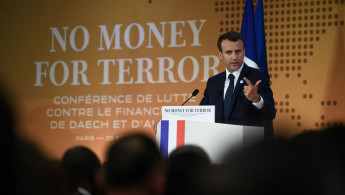Macron calls for global cooperation to cut off funds to extremists
French President Emmanuel Macron warned that the militants "use all contemporary forms of financing" in an address at the closing of a two-day conference on combating the funding of terror groups at the Organisation for Economic Cooperation and Development (OECD), which brought together around 80 ministers and 500 experts.
"We have to cut off terrorism at its roots: it feeds on human trafficking, drugs and weapons. There's always an underlying economy," said Macron, urging global "transparency and mobilisation."
"We have to cross to a new stage in the fight against Daesh and al-Qaeda,” he said, using the Arabic acronym for the Islamic State militant group.
Macron praised the "No money for terror conference" for committing to improving such measures as sharing intelligence, fighting against anonymous financial transactions and identifying sources of funding.
The commas came after France's top anti-terror prosecutor, Francois Molins, had revealed that the country's security services had identified 416 French donors to the Islamic State (IS) group and had also detected 320 fundraisers mainly based in Turkey and Libya who transferred the money to the militants.
‘Low-cost attacks’
Attacks on Western targets have become increasingly low-cost since the 9/11 atrocities in the United States in 2001, particularly in recent years when IS followers have often used only vehicles or automatic weapons to kill people.
But Molins estimated that attacks in France in January 2015 targeting the Charlie Hebdo magazine and a Jewish supermarket would have cost 25,000 euros ($30,000).
More deadly assaults by teams of IS militants in Paris in November of that year, including against the Bataclan concert hall, would have cost an estimated 80,000 euros, he said.
A French presidential official briefing journalists ahead of the terror funding conference this week said that IS income was estimated at about one billion dollars (820 million euros) a year between 2014-2016.
Most of this was from local taxation, oil revenues and looting, with far smaller amounts flowing in from overseas donors.
IS swept across large parts of Syria and neighbouring Iraq in 2014, declaring a cross-border "caliphate" in areas they controlled.
Syrian and Iraqi forces have since driven IS from nearly all the territory it once held, except for a small presence in the remote desert areas along the border.
But French officials are concerned that the money has been transferred out of Syria and Iraq and could be used to rebuild the organisation.
"It has been moved since, at least in part. It's probably somewhere," the official said on condition of anonymity. "These groups are very skilful in using sophisticated techniques to move financial resources around."
Agencies contributed to this report.





 Follow the Middle East's top stories in English at The New Arab on Google News
Follow the Middle East's top stories in English at The New Arab on Google News


